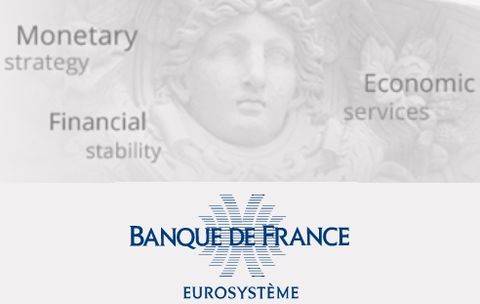Companies news • Publications
Banque de France : latest news

Please find some selected news from Banque de France’s office in Singapore:
Assessment of Risks to the French Financial System – December 2021
The ongoing economic recovery has mitigated short-term risks to the financial sector, notably as corporate positions have stabilised. But medium-term vulnerabilities are becoming more acute with the upswing in the financial cycle, against a backdrop of persistent uncertainty. Some stockmarket indicators, meanwhile, are signalling persistent exuberance, exposing risk-asset markets to a sudden correction that could potentially destabilize non-bank financial intermediaries that use leverage and spread to other market segments.
Banks and insurers remain robust and their profitability is improving, although business models still represent a medium-term challenge. Uncertainties about banks’ credit quality exposures have also eased, enabling credit institutions to write back provisions. Yet vigilance is still needed, owing to macroeconomic uncertainties, high levels of debt, and the wide diversity in financial positions across different sectors and even between companies in the same sector.
It is vital to make the transition to carbon neutrality, a point highlighted by the most recent report by the Intergovernmental Panel on Climate Change (IPCC) in August. This transition could, however, be a source of potential financial risk, depending on how it is approached.
A thematic chapter of this report considers post-Covid trends in the residential property sector. Debt sustainability is ensured not by the value of the asset, but by an assessment of the borrower's income at the moment when the loan is granted. Moreover, since virtually all loans are at fixed rates, borrowers are additionally insulated against higher interest rates.
The development of decentralised finance and growth in crypto-assets and stablecoins markets are also driving the gradual digitalisation of the financial system. The multiple risks associated with these developments, which range from money laundering and terrorist financing to major volatility and exposure to cyber-risk, call for regulatory action to be taken.
Assessment of the French financial system - December 2021 | Banque de France (banque-france.fr)
ACPR Charter for the appraisal of “Fintech” authorisation requests
The Fintech and Innovation Hub helps "Fintech" project initiators to better understand the regulatory framework for activities falling within the scope of the ACPR.
To facilitate your journey, the ACPR has adopted a charter for Fintechs’ authorisation requests and educational materials explaining the applicable regulations.
ACPR Charter for the appraisal of “Fintech” authorisation requests
A blog post on System-wide stress tests: a deep dive into the financial system
The financial system in the euro area (EA) has significantly changed since the 2008 financial crisis. Banks’ dominant position in financial markets waned in favour of non-bank financial intermediaries such as investment funds, pension funds and insurers. Funds’ assets under management more than doubled from 2008 to 2019, reaching EUR 14 trillion. This compares to total assets of around EUR 31 trillion held by euro area credit institutions, which have remained broadly stable since 2008. These developments raise new questions but also new challenges for the analysis of financial stability, calling for a more holistic risk assessment encompassing the entire financial system and for a better understanding of the complex interactions between different financial intermediaries, including not only banks but also non-bank financial institutions.
System-wide stress tests: a deep dive into the financial system
A working paper on Climate Risk Measurement of Assets Eligible as Collateral for Refinancing Operations – Focus on Asset Backed Securities (ABS)
This paper analyses the exposure to climate risk of ABS, an asset class frequently pledged as collateral in the European Central Bank (ECB) refinancing operations. This paper focuses on ABS backed by auto loans or loans granted to Small and Medium Enterprises (SMEs) and explores ways to measure their climate risk based on the characteristics of the underlying loans, using existing loan-level data requirements. The ultimate goal was to come up with an alignment metric, i.e. to judge whether ABS related emissions would meet the Paris Agreements objectives, a task hindered by the lack of data available (…)
An article on Compiling the balance of payments: a statistical mission at the Banque de France since 1945
Compiling the balance of payments is a “fundamental mission” for the Banque de France under the terms of the 2007 Arthuis law. The aim is, on the one hand, to present a picture of real and financial transactions between France and foreign countries, and, on the other hand, to use these statistics to identify the corresponding balances or imbalances and, from there, their source of financing. Since France published its first official balance of payments in 1945, the tension between these two dimensions has been constantly moving. Depending on developments in national and international economic conditions, the balance of payments has swayed between affirmation of the purpose of these public statistics as objective economic information and the primacy of its foreign exchange and monetary policy purpose. This article looks at the choices that have led to the compilation of the balance of payments in its present form from the point of view of a “history of statistical reasoning” as envisaged by Alain Desrosières.
Compiling the balance of payments: a statistical mission at the Banque de France since 1945
An article on Ten years on from the business tax reform: how has it affected companies’ behaviour?
In 2010, the French corporation tax known as the local economic contribution or CET (contribution économique territoriale) replaced the business tax (TP – taxe professionnelle). This latter tax on production had come under frequent criticism because it hampered companies’ competitiveness and productivity, particularly because the tax base included non-real estate assets. These assets are now excluded from the tax base. This article looks at the effects of that reform, which had a significant impact on companies, whose activity has increased as a result (…)
Ten years on from the business tax reform: how has it affected companies’ behaviour?


